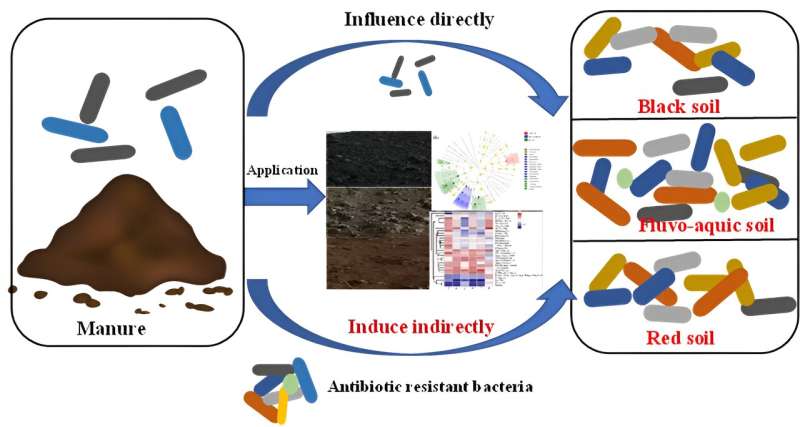This article has been reviewed according to Science X's editorial process and policies. Editors have highlighted the following attributes while ensuring the content's credibility:
fact-checked
proofread
Study finds manure control effective in reducing soil antibiotic-resistant bacteria

In agroecosystems where manure is applied as organic fertilizer, these antibiotic residues exert strong selective pressure on soil microbial communities. Antibiotic-resistant bacteria (ARB) from animal manure would increase the concentration of ARB in soils.
The influencing mechanisms of soil types on the distribution of ARB were worthy of further exploration. This study demonstrates that CTC-manure induced more resistance of soil indigenous microbes in fluvo-aquic soil. Lactobacillus, Dyella, Ralstonia, and Bacillus were the key genera, and the study finds that manure control is an effective way to reduce the risk of soil ARB.
The researchers' findings appear in Soil Ecology Letters.
A series of studies on the risk of ARB and antibiotic-resistant genes (ARGs) have been conducted by Institute of Environment and Sustainable Development in Agriculture, Chinese Academy of Agricultural Sciences. For example, they found that Chloroflexi was closely associated with ARGs removal, and potential host bacteria of ARGs varied with different antibiotics. They also found multidrug resistance genes increased the most in red soil with antibiotics, and ARGs were directly influenced by microbes, indirectly affected by soil properties.
Professor Li said, "Agricultural production has caused a heavy burden on the environment, and the overall trend of deterioration is still increasing. This is a contradiction that must be resolved. The results of the second national survey of pollution sources released recently showed that the pollution load from agricultural sources exceeded that of industry and cities, highlighting the importance and urgency of agricultural environmental protection work."
"Therefore, we chose and explored agricultural and rural environmental protection issues, hoping to contribute to the solution of environmental problems."
In this study, they found that a higher shift in the operational taxonomic units and the community composition of chlortetracycline (CTC)-resistant bacteria (CRB) were observed in fluvo-aquic soil than in black and red soils.
CTC induced antibiotic resistance development in soil indigenous microorganisms (Streptomyces, Pseudomonas, Bacillus, Rhodococcus, and Paenibacillus), and the induction was most obvious in fluvo-aquic soil. Additionally, the key different genera were Microbacteriaceae (black soil), Lactobacillus, unclassified_c__Bacilli and Paenibacillus (fluvo-aquic soil), and Dyella, Ralstonia and Bacillus (red soil).
It was concluded that manure application led to higher CRB risk in fluvo-aquic soil compared with black and red soils. This result suggests appropriate methods according to soil types are important ways to reduce the risk of soil resistant bacteria during manure return.
Professor Li said, "The application of manure to the soil increased microbial resistance, which was even stronger when the manure contained antibiotic residues. Moreover, manure application led to higher CRB risk in fluvo-aquic soil compared with black and red soils. As a result, scientific manure return according to soil types is also important for monitoring the risk of resistance in agricultural practice."
Soil is relevant to our lives; it is fundamental to food security, water security and entire ecosystem health. Monitoring soil antibiotic risk is more important than ever.
More information: Tingting Song et al, Distribution of antibiotic resistant bacteria in different soil types following manure application, Soil Ecology Letters (2023). DOI: 10.1007/s42832-023-0210-6
Provided by Higher Education Press





















